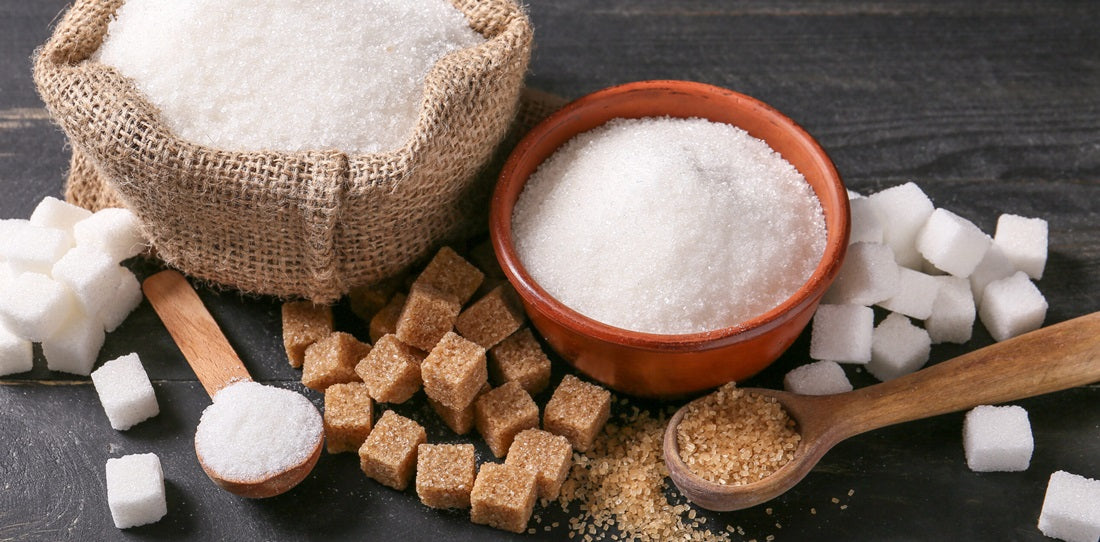Nowadays, the use of sugar has become an integral part of everyday life and it is found in almost every food product, not only sweets and carbonated drinks. For example, in bread, flavored yogurts, protein and muesli bars, salad dressings, and even family health products, such as fermented drinks with lactic acid bacteria. The average amount of sugar in one bottle of such a drink is 12 grams. What are the consequences of this?
It is widely said that too much sugar is bad on a daily basis, but why?
There are several health problems associated with regular, excessive sugar consumption:
- Weight gain : Too much sugar consumption (even in children) can lead to obesity, which is a risk for the development of various chronic diseases. Why? – Sugar that is not used for energy turns into fat, which accumulates in fat cells.
- Fatigue : A lot of sugar gives instant energy, but is followed by a sharp drop in energy.
- Acne: High sugar consumption can cause acne, especially in teenagers.
- Tooth damage : Sugar feeds bacteria in the mouth, which cause tooth demineralization and tooth decay.
- Heart disease: High sugar consumption can contribute to high blood pressure, inflammation and fatty liver disease. These are all risk factors for heart attack and stroke.
- Kidney disease: Fructose can increase the level of urate in the blood, leading to the development of kidney disease, and persistently high blood sugar can damage the delicate blood vessels in the kidneys.
- Risk of gout: Consuming too much sugar can increase the risk of gout.
Not all dietary sugar is absorbed on a daily basis (malabsorption). It moves beyond the digestive tract until it reaches the large intestine, where it is awaited by 1.5-3 kg of hungry bacteria, or the microbiome of each of our intestinal tracts, which needs a food source to exist. The inhabitants of our microbiome are diverse and those who "taste" sugar will do everything possible to get more of it.
A large part of these microorganisms are classified as opertunically pathogenic or bad bacteria. The more sugar we take in, the more sugar-loving ( saccharolytic ) bacteria multiply and our own probiotics, or good bacteria, decrease. Respectively, our microbiome ecosystem is disrupted and the consequences are felt by a person - both a child and a senior - as:
- Flatulence: Unabsorbed sugar in the colon feeds gas-producing bacteria. These gases cause bloating and discomfort. Especially relevant for people with digestive system problems such as KZS or SIBO.
- Increased cravings for sweets: Sugar promotes the growth of 'bad' bacteria in the gut, which can lead to increased cravings for sweets as these bacteria 'demand' more sugar.
- Depression and lack of energy: The gut microbiome is closely related to mood and overall energy levels. An imbalance can lead to feelings of depression and lack of energy.
- Skin problems: The gut microbiome also affects skin health. An imbalance can lead to skin problems such as eczema, acne and other skin conditions.
- More frequent illness: Since most of the immune system resides in the gut, an imbalance of the microbiome can affect immune function, increasing the risk of disease.
What can you do?
The first thing we recommend is to reduce your sugar intake and increase the amount of fiber in your diet.
But making these changes is not so easy. Long-term use of sugar has resulted in a greater or lesser dependence, which is maintained by the two-way communication between the brain and the intestinal tract - the so-called Gut Brain Axis .
In simple terms, the bacteria send signals to the brain, affecting the hormones responsible for appetite and increasing sugar cravings, so that the 'bad' bacteria have a food source.
In order to have fewer sent signals, the number of senders must be reduced! One of the more effective ways to do this is to multiply our own probiotic 'good' bacteria by giving them a prebiotic food source.
Prebiotics - those soluble fibers and "bad" bacteria cannot eat them, but the good ones can. Therefore, the "good" bacteria multiply, prevail over the "bad" and in the long term help to organize our body and prevent many of the well-being and health problems mentioned above.
Not all good bacteria eat the same prebiotics, so it is important to choose the most valuable prebiotics possible, without additional sweeteners. ( For example, by eating whole grain bread every day, which contains not only prebiotic beta-glucans, but also sugar, we will feed both good and bad bacteria.)
Preimmu = 150 different compounds , which ensure a very wide reproduction of our probiotics ('good' bacteria). If you use 1 packet a day already within the first month, you will notice reduced sugar cravings and improved well-being.



